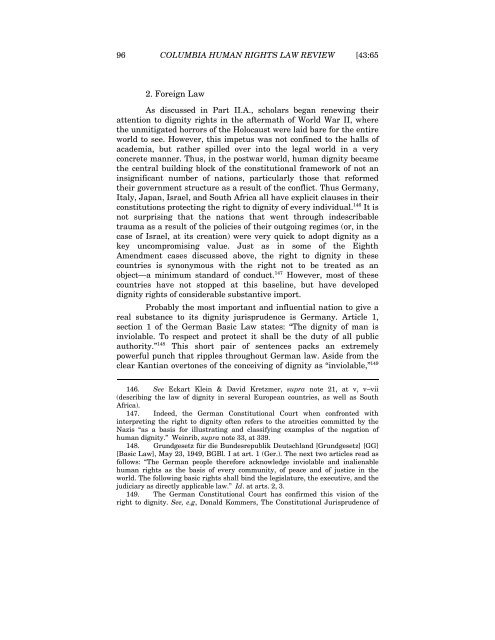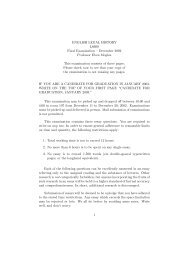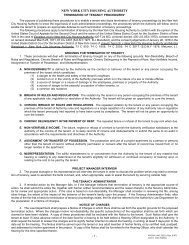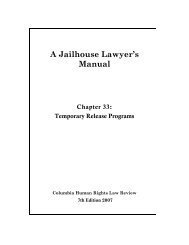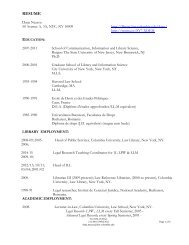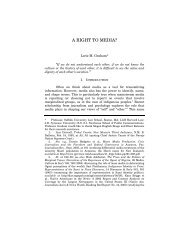The Right to Dignity Rex D. Glensy - Columbia Law School
The Right to Dignity Rex D. Glensy - Columbia Law School
The Right to Dignity Rex D. Glensy - Columbia Law School
Create successful ePaper yourself
Turn your PDF publications into a flip-book with our unique Google optimized e-Paper software.
96 COLUMBIA HUMAN RIGHTS LAW REVIEW [43:65<br />
2. Foreign <strong>Law</strong><br />
As discussed in Part II.A., scholars began renewing their<br />
attention <strong>to</strong> dignity rights in the aftermath of World War II, where<br />
the unmitigated horrors of the Holocaust were laid bare for the entire<br />
world <strong>to</strong> see. However, this impetus was not confined <strong>to</strong> the halls of<br />
academia, but rather spilled over in<strong>to</strong> the legal world in a very<br />
concrete manner. Thus, in the postwar world, human dignity became<br />
the central building block of the constitutional framework of not an<br />
insignificant number of nations, particularly those that reformed<br />
their government structure as a result of the conflict. Thus Germany,<br />
Italy, Japan, Israel, and South Africa all have explicit clauses in their<br />
constitutions protecting the right <strong>to</strong> dignity of every individual. 146 It is<br />
not surprising that the nations that went through indescribable<br />
trauma as a result of the policies of their outgoing regimes (or, in the<br />
case of Israel, at its creation) were very quick <strong>to</strong> adopt dignity as a<br />
key uncompromising value. Just as in some of the Eighth<br />
Amendment cases discussed above, the right <strong>to</strong> dignity in these<br />
countries is synonymous with the right not <strong>to</strong> be treated as an<br />
object—a minimum standard of conduct. 147 However, most of these<br />
countries have not s<strong>to</strong>pped at this baseline, but have developed<br />
dignity rights of considerable substantive import.<br />
Probably the most important and influential nation <strong>to</strong> give a<br />
real substance <strong>to</strong> its dignity jurisprudence is Germany. Article 1,<br />
section 1 of the German Basic <strong>Law</strong> states: “<strong>The</strong> dignity of man is<br />
inviolable. To respect and protect it shall be the duty of all public<br />
authority.” 148 This short pair of sentences packs an extremely<br />
powerful punch that ripples throughout German law. Aside from the<br />
clear Kantian over<strong>to</strong>nes of the conceiving of dignity as “inviolable,” 149<br />
146. See Eckart Klein & David Kretzmer, supra note 21, at v, v–vii<br />
(describing the law of dignity in several European countries, as well as South<br />
Africa).<br />
147. Indeed, the German Constitutional Court when confronted with<br />
interpreting the right <strong>to</strong> dignity often refers <strong>to</strong> the atrocities committed by the<br />
Nazis “as a basis for illustrating and classifying examples of the negation of<br />
human dignity.” Weinrib, supra note 33, at 339.<br />
148. Grundgesetz für die Bundesrepublik Deutschland [Grundgesetz] [GG]<br />
[Basic <strong>Law</strong>], May 23, 1949, BGBl. I at art. 1 (Ger.). <strong>The</strong> next two articles read as<br />
follows: “<strong>The</strong> German people therefore acknowledge inviolable and inalienable<br />
human rights as the basis of every community, of peace and of justice in the<br />
world. <strong>The</strong> following basic rights shall bind the legislature, the executive, and the<br />
judiciary as directly applicable law.” Id. at arts. 2, 3.<br />
149. <strong>The</strong> German Constitutional Court has confirmed this vision of the<br />
right <strong>to</strong> dignity. See, e.g, Donald Kommers, <strong>The</strong> Constitutional Jurisprudence of


